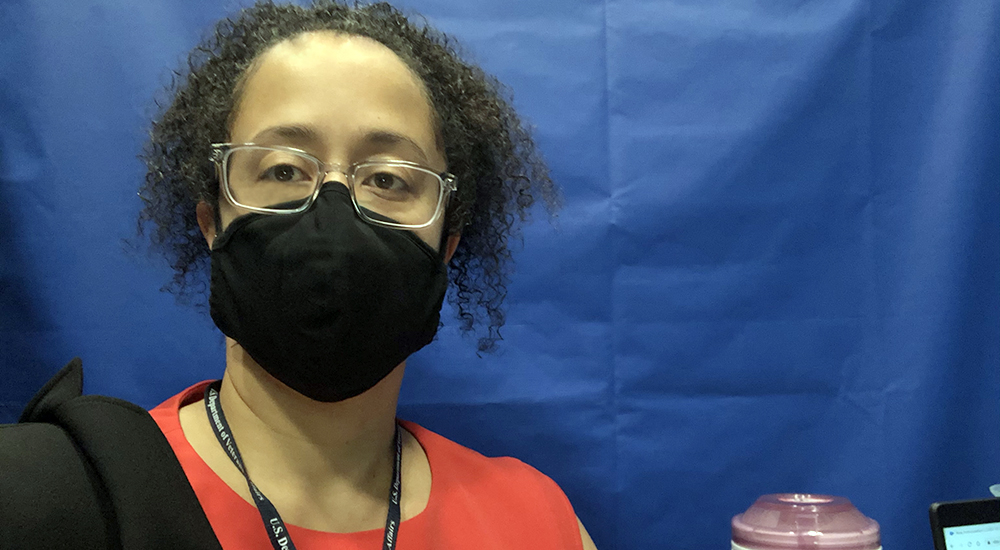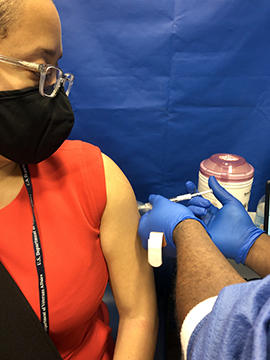The COVID-19 pandemic has disrupted so many lives around the nation, as well as throughout our VA health care system. We long to get back to a sense of “normal” that allows us to mingle with family and friends, have the freedom to shop and eat where we like, and not be fearful of the person who walks by us on the street.
This virus is an enemy unlike any of us have seen in our lifetime. I am grateful for the many heroes that we have on the front line throughout the VA that have worked long hours, volunteered for missions throughout our system, and supported our Veterans throughout this public health emergency.
But so many of us working at VA also live with a frustration that makes this pandemic even more troubling. So many of us, particularly from communities of color, are seeing or experiencing the unequal effect of the virus on our family and neighborhoods. We question what is happening and how it could have gotten this bad.
We also know that this is not a new situation – that health care disparities exist, that care is sometimes not given equally, and that it is sometimes difficult for us to trust what we are told, with history painting a tainted picture for us personally. We provide great service in our day-to-day lives and jobs, but sometimes do not receive the same in return when our own health care is on the line.
In addition, while the health care enterprise looks toward research as the solution, our communities are even more marginalized by a history of tragic occurrences which affect our ability to receive and trust medical and public health advice.
As an African American woman, I understand the hesitance that so many of us feel toward obtaining the new COVID-19 vaccine. I have taken the vaccine. It is an act of service to yourself and to those around you. I have had conversations with family and friends about the same concerns that you have: Will the vaccine be safe? Will it affect my diabetes/asthma/hypertension? Will I experience a side effect-like soreness, numbness, or something more serious like Bell’s Palsy?
These are the right questions to ask as you consider whether you should receive the vaccine. But let me tell you, I still strongly recommend that you take the vaccine. My parents will take the vaccine. My friends on the front line in hospitals around this country have taken the vaccine.
I ask that you encourage your family and friends to do the same when their time comes.
As we seek solutions for our communities, we should remain informed of the medical advances that become available and have open dialogue that is honest and filled with fact. Based on what we currently know, the evidence is clear. If you have a chronic disease like diabetes or asthma, your risk of death from COVID-19 is indeed elevated.
Of course, there are the more commonly reported side effects of sore arm from the injection, or headache, fatigue and fever. But the data (not just a belief) clearly shows the likelihood that the vaccine will protect you far outweighs any potential harm that it may cause. I myself only experienced some soreness around the injection site – but did not have any further symptoms – and was able to continue with my day after an early 7:30 a.m. appointment.
While we can’t guarantee that you won’t have any serious side effects, there are millions of people who have received the vaccine with little or no side effects, like me.
As the lead physician for VA, I ask you to trust those of us who are serving you. I stand on the shoulders of giants who promote strong public health practices, like vaccinations, seat belt usage, and tobacco cessation. Yes, there are some health care professionals on the news or social media who are speaking out against the vaccine, but I hope that you would instead listen to the larger statistics that those professionals seem to not acknowledge.
I applaud those VA staff members who have already stepped up and taken the vaccine. I recognize that some others are waiting to learn more and to see what others’ decisions might be. Keep in mind that every day, more and more people contract the virus and more and more die from the virus.
If you are indeed one of these earlier groups that qualify for the vaccine, it is because you are at higher risk for illness or even death from the virus, and now is the time to act. Now is the time to protect yourself.
Kameron Leigh Matthews, MD, JD, FAAFP, is the assistant Under Secretary for Health for Clinical Services, Chief Medical Officer.
Topics in this story
More Stories
Veteran Byron Potier weighed almost 300 pounds and was tired and lethargic. He was the perfect candidate for gastric sleeve surgery.
How much do you know about VA care, benefits and services? Don’t miss out on what you've earned—check out the "2025 VA Federal Benefits Guide for Veterans, Dependents, Survivors, and Caregivers" handbook to learn more.
Feeling stressed? Your breath can help you relax and focus. Take 3 minutes to reset and prioritize your well being for this week's #LiveWholeHealth practice.








I would like to be notified when vaccine is eligible for qualified recipients. David Neal age 81
We recommend you sign up to stay informed about VHA’s COVID plans or talk to your provider: https://www.va.gov/health-care/covid-19-vaccine/
Please advice me anticipation of getting
the Covid Vaccine due to my health issues
of two heart stents and Dystonia. I called
to get my place in line for vaccine at your
Bay Pine Location.
Thank you
If you have questions about how your personal risk for COVID-19 will determine when you can get a vaccine, send a secure message to your VA health care provider. https://www.va.gov/health-care/secure-messaging/ If you don’t receive care at VA, contact your primary health care provider. To learn more about people at increased risk, go to the CDC website. https://www.cdc.gov/coronavirus/2019-ncov/need-extra-precautions/index.html